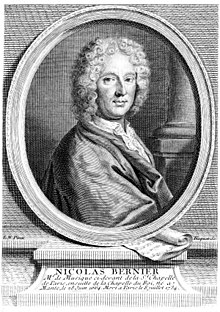Nicolas Bernier
Nicolas Bernier (born June 28, 1664 in Mantes-la-Jolie , † September 5, 1734 ) was a French composer , harpsichordist and music theorist.
Life
Nicolas Bernier received his first musical training as a choirboy at the cathedral of his native city and that of Évreux . He then studied in Rome with Antonio Caldara . In 1692 he settled in Paris. When applying for the position of conductor of the cathedral of Rouen , he was defeated by Jean-François Lalouette , the student and secretary of Lully .
From 1694 to 1698 he headed the choir of the Cathedral of Chartres, then that of Saint-Germain-l'Auxerrois in Paris. In 1700 he performed his Te Deum in front of the king in Fontainebleau with great success , which was played in various churches in Paris in the following years.
In 1705 he followed Marc-Antoine Charpentier as musical director at the Sainte-Chapelle in Paris; he held this position until 1726. From 1723 he was one of the four musical directors of the “Chapelle royale” alongside Michel-Richard Delalande , Charles-Hubert Gervais and André Campra .
Bernier published several volumes of motets as well as sacred and secular cantatas . The cantatas were reprinted in the series The Eighteenth-Century French Cantata (New York, 1990).
Works
- Premier livre de motets à 1, 2, et 3 voix , 1703
- Deuxième livre de motets , 1713
- Livres 1-4 de cantates profanes à 1 et 2 voix , 1715
- Les nuits de Sceaux , 1715, 1718 and 1723
- Livres 6-8 de cantates profanes , 1718
- Chant des offices de différents saints nouveaux, composés en plain- chant par le sieur Bernier , 1724
- Recueil de 20 motets , 1741
Web links
- Short biography and works on the website musicologie.org
- Sheet music and audio files by Nicolas Bernier in the International Music Score Library Project
| personal data | |
|---|---|
| SURNAME | Bernier, Nicolas |
| BRIEF DESCRIPTION | French composer |
| DATE OF BIRTH | June 28, 1664 |
| PLACE OF BIRTH | Mantes-la-Jolie |
| DATE OF DEATH | September 5, 1734 |
| Place of death | Paris |
